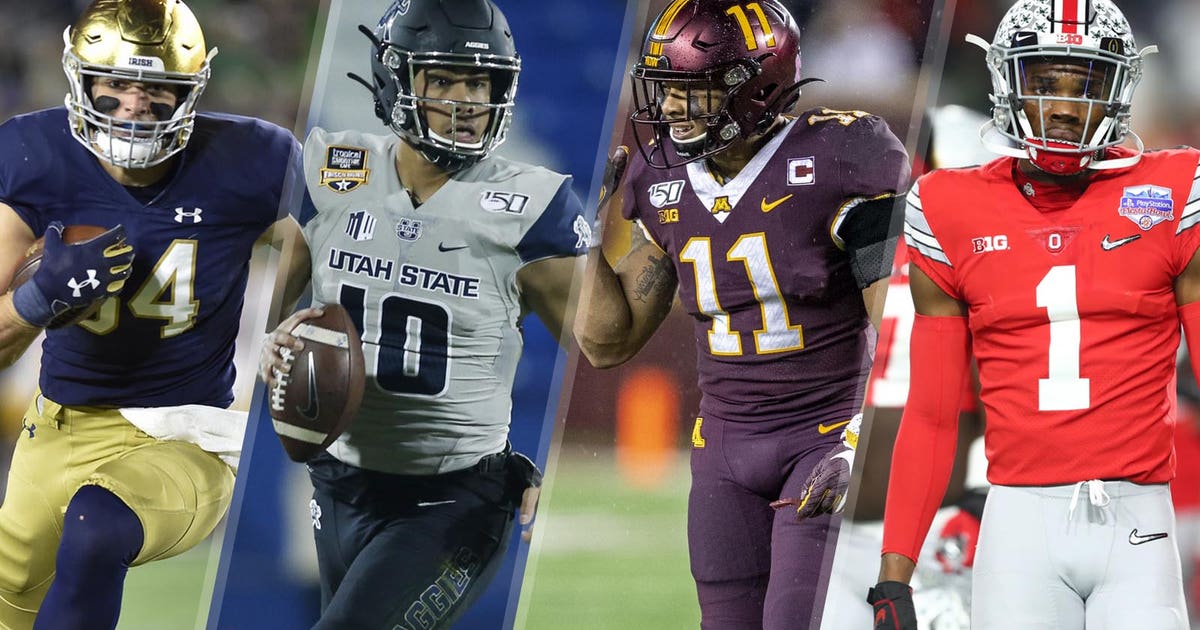How NFL draft affected Vikings’ 2020 opponents


The Minnesota Vikings are getting rave reviews from their record-setting 15-player draft class of 2020. But what about their opponents? FOX Sports North takes a closer look at Minnesota’s foes in 2020 and how the rosters scheduled to line up against the purple have improved (or not).
(Teams listed in alphabetical order.)
Atlanta Falcons (home)
Atlanta’s pass defense ranked 22nd last season. So, it only makes sense that it selected Clemson cornerback AJ Terrell at No. 16 overall, especially considering future Hall of Fame quarterback Tom Brady is now in the NFC South. The Falcons also improved their pass rush in free agency with Dante Fowler Jr. and in the second round of the draft with Marlon Davidson. And adding a punter in the seventh round is always fun.
Picks
Round 1 — AJ Terrell, CB, Clemson
Round 2 — Marlon Davidson, DE, Auburn
Round 3 — Matt Hennessy, C, Temple
Round 4 — Mykal Walker, LB, Fresno St.
Round 4 — Jaylinn Hawkins, S, California
Round 7 — Sterling Hofrichter, P, Syracuse
Carolina Panthers (home)
The Panthers finished dead last in the NFC by giving up 470 points last season. Wondering what Carolina’s priority was in the NFL draft? The Panthers had seven picks — and all seven were used to address their defense, which saw perhaps the best defensive player in franchise history, Luke Kuechly, retire after the 2019 campaign. Derrick Brown and Yetur Gross-Matos should start immediately, and the Panthers hope Troy Pride can be another middle-round gem like Josh Norman in 2012. Under new head coach Matt Rhule, the offense is in good hands with Christian McCaffrey pairing with quarterback Teddy Bridgewater.
Picks
Round 1 — Derrick Brown, DT, Auburn
Round 2 — Yetur Gross-Matos, DE, Penn St.
Round 2 — Jeremy Chinn, S, Southern Illinois
Round 4 — Troy Pride, CB, Notre Dame
Round 5 – Kenny Robinson, S, West Virginia
Round 6 – Bravvion Roy, DT, Baylor
Round 7 – Stantley Thomas-Oliver, CB, Florida International
Chicago Bears (home & away)
Chicago made headlines in the offseason by gifting washed-up tight end Jimmy Graham a two-year deal worth $16 million in free agency. The Bears, who didn’t have a first-round pick due to the Khalil Mack trade in 2018, then doubled down at the position with their first choice in the draft. A head-scratcher, to say the least. Chicago has had just three selections in the first three rounds for the past two drafts combined. Not great for a team that finished 8-8 last season and continues to struggle finding an offensive identity (and … an adequate quarterback).
Picks
Round 2 – Cole Kmet, TE, Notre Dame
Round 2 – Jaylon Johnson, CB, Utah
Round 5 – Trevis Gipson, DE, Tulsa
Round 5 – Kindle VIldor, CB, Georgia Southern
Round 5 – Darnell Mooney, WR, Tulane
Round 7 — Arlington Hambright, OT, Colorado
Round 7 — Lachavious Simmons, G, Tennessee St.
More Vikings NFL Draft coverage
Dallas Cowboys (home)
Dallas had a nice draft. Really nice. CeeDee Lamb was the third wide receiver off the board at No. 17, and the Cowboys scooped up Stefon Diggs’ highly touted brother, Trevon Diggs, in Round 2. Then, they added Wisconsin’s Tyler Biadasz in the fourth round, a player who was named the top center in college football last season and should be a natural fill-in a for former Badgers center, the recently retired Travis Frederick.
Picks
Round 1 — CeeDee Lamb, WR, Oklahoma
Round 2 — Trevon Diggs, CB, Alabama
Round 3 — Neville Gallimore, DT, Oklahoma
Round 4 — Reggie Robinson, CB, Tulsa
Round 4 — Tyler Biadasz, C, Wisconsin
Round 5 — Bradlee Anae, DE, Utah
Round 7 — Ben DiNucci, QB, James Madison
Detroit Lions (home & away)
Detroit’s biggest move of the offseason was trading one-time All-Pro Darius Slay, the Lions’ lock-down cornerback for the last seven seasons, to Philadelphia. So, it only made sense the Lions used their first-round pick to select Jeff Okudah, a cornerback with all of the physical skills. Georgia’s D’Andre Swift joins a long list of running backs — Ameer Abdullah, Jahvid Best, Kerryon Johnson and Kevin Jones – tasked with reviving the Lions rushing attack, something the franchise has been searching for since Barry Sanders retired in 1999. And Detroit might have grabbed a sleeper in the fifth round in Wisconsin wideout Quintez Cephus, who could contribute behind wide receivers Kenny Golladay and Marvin Jones.
Picks
Round 1 – Jeff Okudah, CB, Ohio St.
Round 2 – D’Andre Swift, RB, Georgia
Round 3 – Julian Okwara, DE, Notre Dame
Round 3 – Jonah Jackson, G, Rutgers
Round 4 – Logan Stenberg, G, Kentucky
Round 5 – Quintez Cephus, WR, Wisconsin
Round 5 – Jason Huntley, RB, New Mexico St.
Round 6 – John Penisini, DT, Utah
Round 7 – Jashon Cornell, DT, Ohio St.
Green Bay Packers (home & away)
The rival Packers had, by far, the strangest draft of any NFL team. Green Bay’s biggest need heading into the draft was at wide receiver, where its depth chart is rather bare behind Davante Adams. A 36-year-old Aaron Rodgers could use a few more offensive weapons for the final four years remaining on his contract. There were 37 wide receivers taken in the 2020 draft, but not a single one by the Packers. Even weirder, Green Bay traded up in the first round to draft Jordan Love, who is the apparent heir to Rodgers at quarterback. The Packers then selected bruising tailback AJ Dillion in the second round, a position already locked down by the up-and-coming Aaron Jones, and then took a tight end in the third. What are the Packers doing? No one seems to know.
Picks
Round 1 – Jordan Love, QB, Utah St.
Round 2 – AJ Dillon, RB, Boston College
Round 3 – Josiah Deguara, TE, Cincinnati
Round 5 – Kamal Martin, LB, Minnesota
Round 6 – Jon Runyan, OT, Michigan
Round 6 – Jake Hanson, C, Oregon
Round 6 – Simon Stepaniak, OT, Indiana
Round 7 – Vernon Scott, S, TCU
Round 7 – Jonathan Garvin, DE, Miami
Houston Texans (away)
Bill O’Brien might be out of a job soon. The general manager and coach of the Texans traded superstar wide receiver DeAndre Hopkins to Arizona for 28-year-old running back David Johnson, then used one of the picks acquired in that transaction to get Brandin Cooks. Cooks isn’t bad. But he’s not Hopkins. Houston didn’t have a first-round selection because of its trade before the 2019 season for tackle Laremy Tunsil. Even if Houston’s draft picks contribute in 2020, the Texans are in much, much worse shape than they were last season.
Picks
Round 2 — Ross Blacklock, DT, TCU
Round 3 — Jonathan Greenard, DE, Florida
Round 4 — Charlie Heck, OT, North Carolina
Round 4 — John Reid, CB, Penn St.
Round 5 — Isaiah Coulter, WR, Rhode Island
Indianapolis Colts (away)
Did the Colts find their quarterback of the future in the fourth round? Washington’s Jacob Eason has arm talent that rivals all other quarterbacks in the 2020 class, but questions of character and commitment that arose during the combine dropped him in the draft. He’ll sit behind veterans Philip Rivers and Jacoby Brissett in 2020 and try to prove the critics wrong. For the time being, Indianapolis added offensive weapons for Rivers to use right away in Michael Pittman Jr. and Jonathan Taylor, the latter of whom rushed for 2,000 yards in back-to-back seasons at Wisconsin.
Picks
Round 2 — Michael Pittman, WR, USC
Round 2 — Jonathan Taylor, RB, Wisconsin
Round 3 — Julian Blackmon, S, Utah
Round 4 — Jacob Eason, QB, Washington
Round 5 — Danny Pinter, G, Ball St.
Round 6 — Robert Windsor, DT, Penn St.
Round 6 — Isaiah Rodgers, CB, Massachusetts
Round 6 — Dezmon Patmon, WR, Washington St.
Round 6 — Jordan Glasgow, LB, Michigan
Jacksonville Jaguars (home)
Jacksonville picked one spot ahead of the Vikings in the fourth round and snagged St. John’s University (Minn.) offensive lineman Ben Bartch at No. 116 overall. Bartch, who committed to Division III St. John’s as a tight end but switched to left tackle in 2018, is one of the more intriguing projects in the draft. Jacksonville really boosted its defense by selecting six players on that side of the ball in its first eight picks of the draft.
Picks
Round 1 — C.J. Henderson, CB, Florida
Round 1 — K’Lavon Chaisson, DE, LSU
Round 2 — Laviska Shenault, WR, Colorado
Round 3 — DaVon Hamilton, DT, Ohio St.
Round 4 — Ben Bartch, G, St. John’s (Minn.)
Round 4 — Josiah Scott, CB, Michigan St.
Round 4 — Shaquille Quarterman, LB, Miami
Round 5 — Daniel Thomas, S, Auburn
Round 5 — Collin Johnson, WR, Texas
Round 6 — Jake Luton, QB, Oregon St.
Round 6 — Tyler Davis, TE, Georgia Tech
Round 7 — Chris Claybrooks, CB, Memphis
New Orleans Saints (away)
While the Vikings set an NFL record with 15 draft choices, New Orleans added just four. The Saints began the draft by selecting Michigan center Cesary Ruiz in the first round. He’ll be tasked with protecting aging quarterback Drew Brees for the final year(s) of his career. New Orleans then traded up in the third round to select linebacker Zack Baun, and then added tight end Adam Trautman later on. At 6-foot-5 and 255 pounds, Trautman could be a red-zone target at tight end that the Saints have missed since Graham departed in 2015.
Picks
Round 1 — Cesar Ruiz, C, Michigan
Round 3 — Zack Baun, LB, Wisconsin
Round 3 — Adam Trautman, TE, Dayton
Round 7 — Tommy Stevens, QB, Mississippi St.
Seattle Seahawks (away)
Staying on brand in Seattle, the Seahawks had perhaps the biggest reach of the first round by selecting linebacker Jordyn Brooks at No. 27 overall. Even Brooks himself was surprised by the pick. Offensive line has been the biggest issue in Seattle for what seems like Russell Wilson’s entire NFL career. While they only selected one lineman in Damien Lewis, he’s good value in the third round. And running back DeeJay Dallas, who tallied 833 total yards and 10 touchdowns for Miami last season, should be a productive fourth-round find.
Picks
Round 1 — Jordyn Brooks, LB, Texas Tech
Round 2 — Darrell Taylor, DE, Tennessee
Round 3 — Damien Lewis, G, LSU
Round 4 — Colby Parkinson, TE, Stanford
Round 4 — DeeJay Dallas, RB, Miami
Round 5 — Alton Robinson, DE, Syracuse
Round 6 — Freddie Swain, WR, Florida
Round 7 — Stephen Sullivan, TE, LSU
Tampa Bay Buccaneers (away)
Tampa Bay might have had the favorite draft of any Minnesota Gophers fans out there. The Bucs selected safety Antoine Winfield Jr. in the second round, then doubled down on Gophers and chose wide receiver Tyler Johnson in the fifth. Johnson finds himself in a great situation catching passes from Brady and behind veterans Mike Evans and Chris Godwin on the depth chart. Of Tampa Bay’s seven selections, five were from the Big Ten.
Picks
Round 1 — Tristan Wirfs, OT, Iowa
Round 2 — Antoine Winfield Jr., S, Minnesota
Round 3 — Ke’Shawn Vaughn, RB, Illinois
Round 5 — Tyler Johnson, WR, Minnesota
Round 6 — Khalil Davis, DT, Nebraska
Round 7 — Chapelle Russell, LB, Temple
Round 7 — Raymond Calais, RB, Louisiana
Tennessee Titans (home)
The Titans surprised the football world by defeating New England in the wild-card round, then shocked everyone by taking down top-seeded Baltimore to reach the AFC title game. So, how did Tennessee improve in the draft? By bolstering its strengths in a run-heavy offense. The Titans chose tackle Isaiah Wilson in the first round, then selected Darrynton Evans in the third, a running back who seems like a great fit to contribute behind the NFL’s leading rusher in 2019, Derrick Henry. Tennessee also scooped up first-round value in the second with LSU cornerback Kristian Fulton. Mike Vrabel is coaching a unique roster in today’s pass-heavy NFL, but it’s a good one.
Picks
Round 1 – Isaiah Wilson, OT, Georgia
Round 2 – Kristian Fulton, CB, LSU
Round 3 – Darrynton Evans, RB, Appalachian St.
Round 5 – Larrell Murchison, DT, North Carolina St.
Round 7 – Cole McDonald, QB, Hawaii
Round 7 – Chris Jackson, S, Marshall







